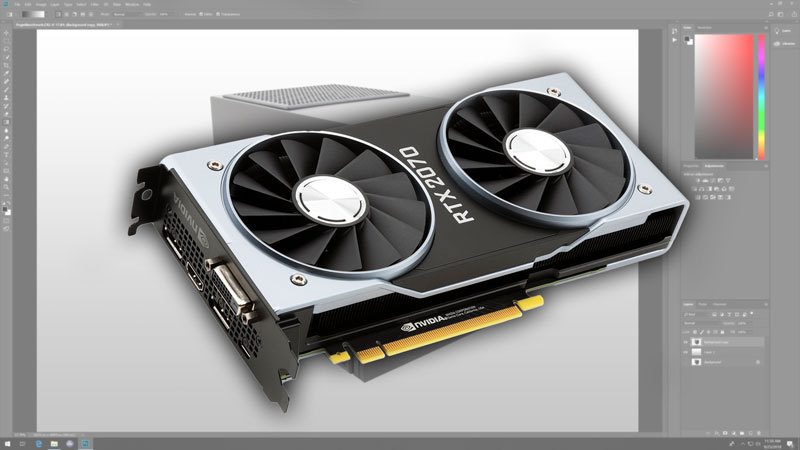Table of Contents
Introduction
Photoshop CC 2019 adds a bunch of new features, but there is very little mentioned in the update notes about there being any significant performance improvements. At the same time, NVIDIA's new RTX GPUs are now available, but as we saw in our previous Photoshop CC 2018: NVIDIA GeForce RTX 2080 & 2080 Ti Performance article, Photoshop currently doesn't really need all the power that these cards have.
So why are we publishing another round of tests looking at the RTX cards in Photoshop? Well, there are three things that have changed since our previous article came out:
- Photoshop CC 2019 has launched
- The NVIDIA GeForce RTX 2070 8GB GPU is now available
- The Intel Core i9 9900K 8 Core CPU is now available which is 16% faster than the i7 8700K in Photoshop
To be honest, we don't expect any of these to really change our conclusions, but the more things change, the more likely we are to be surprised by something we didn't expect. So, it is time to update our Photoshop CC GPU testing with the latest hardware and software.
If you would like to skip over our test setup and benchmark result/analysis sections, feel free to jump right to the Conclusion section.
Test Setup & Methodology
Listed below is the test platform we will be using in our testing:
| Test Hardware | |
| Motherboard: | Gigabyte Z390 Aorus Pro WiFi |
| CPU: | Intel Core i9 9900K 8 Core 3.6GHz (5.0GHz Turbo) |
| RAM: | 4x DDR4-2666 16GB (64GB total) |
| Hard Drive: | Samsung 960 Pro 1TB M.2 PCI-E x4 NVMe SSD |
| OS: | Windows 10 Pro 64-bit |
| Software: | Photoshop CC 2019 (ver. 20.0.0) |
To see how the new RTX cards perform in Photoshop, we tested it against a selection of cards from NVIDIA and AMD as well as the integrated Intel UHD 630 graphics that is built into the Core i9 9900K.
For the testing itself, we will be using version 18.10 of our Puget Systems Photoshop CC 2019 Benchmark which is currently available for public download. This benchmark tests a range of general tasks (open/save, resize, content aware fill, etc.), filters, as well as panorama photomerge. Not all of these tasks are GPU accelerated, however, so in this article we will primarily be looking at just the tasks that are as well as the combined "GPU Score" from these tasks. Full details on the benchmark are available on the benchmark download page.
Benchmark Results
While our benchmark presents various scores based on the performance of each task, we also wanted to provide the individual result for each task in case there is a specific task someone may be interested in. Tests that are directly utilizing the GPU are marked in blue, but feel free to skip to the next section for our analysis of these results.
Benchmark Analysis
Our Photoshop Benchmark includes a large number of tasks that don't utilize the GPU, but there are five tasks in our benchmark that should show a benefit to having a more powerful GPU. Along with all the other tasks, these are run in both 8 Bits/Channel and 16 Bits/Channel mode and make up the two GPU scores of our benchmark.
If you like big, drastic performance differences, you will be disappointed. Almost any dedicated GPU is going to be way faster than the integrated graphics on the Intel Core i9 9900K, but once you get to a mid-range card, there really isn't much to gain from using a more powerful GPU. Technically, the RTX 2080 and RTX 2080 Ti are the fastest GPUs we have ever tested for Photoshop and the RTX 2070 is only 2% slower than them… but even the GTX 1070 kept up with them. To be fair, this isn't the fault of these cards at all, it is simply the fact that Photoshop is typically much more CPU-limited even when we are using the Core i9 9900K which is the fastest CPU for Photoshop currently available.
Are the RTX video cards good for Photoshop CC 2019?
Since Photoshop is relatively light in the way of GPU acceleration, the RTX 2070, 2080 and 2080 Ti probably aren't worth purchasing simply for their raw performance. They are technically among the fastest GPUs we have ever tested for Photoshop, but they are only 8% faster than a humble GTX 1060.
Something to keep in mind is that while the RTX GPUs are not necessary for Photoshop today, there is a chance that they will be better in the future. These cards have new types of cores (RT and Tensor cores) that could potentially have significant performance advantages for some tasks. Or, they might never be used in Photoshop at all. It really comes down to whether or not the Photoshop developers are willing or able to make effectively use of these new features. With how much Adobe is investing in Machine Learning with their Adobe Sensei program, our guess is that at least the Tensor cores will eventually be leveraged in some way, but whether it will happen in Photoshop CC 2020 or Photoshop CC 2030 is unknown at the moment.
Overall, the RTX cards are likely more powerful than you would ever need for Photoshop, but if you already need a high-end GPU for other applications (Premiere Pro, GPU-based rendering, etc.) we would highly recommend using one of these RTX cards over the older GTX series if possible. Exactly which GPU to choose, however, it going to be largely decided by those other applications rather than Photoshop.
If you are interested in how the RTX cards perform in other applications, be sure to check out our recent Video Card articles as we have a number of other articles for the RTX series GPUs.
Puget Systems offers a range of powerful and reliable systems that are tailor-made for your unique workflow.

